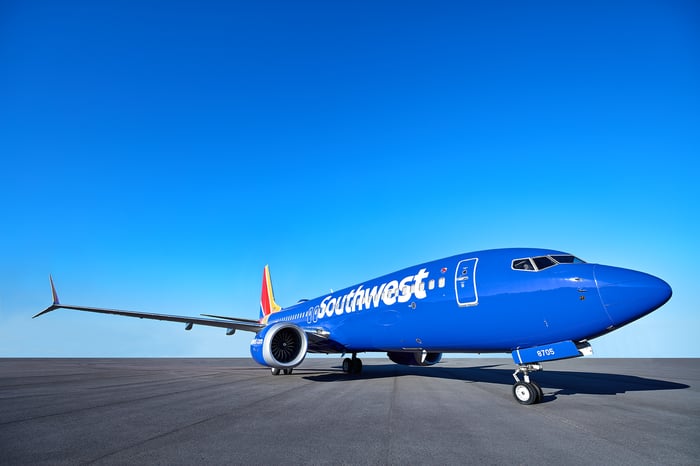In conjunction with its Q2 earnings report in late July, Southwest Airlines (LUV 1.44%) announced that it will stop flying to Newark Airport in early November, because of persistent underperformance there. Instead, the popular low-fare carrier will consolidate all of its New York City-area operations at LaGuardia Airport.
This move will further entrench United Airlines' (UAL 2.83%) dominance at Newark Airport. However, United's market share gains could prove short-lived. Last week, budget carrier Frontier Airlines (which remains privately held, for now) announced that it will enter Newark Airport in November and expand to 15 nonstop routes by next spring.

Frontier Airlines plans to start flying from Newark Airport this fall. Image source: Frontier Airlines.
Southwest retreats in Newark
Southwest Airlines' management attributed the decision to exit Newark to several factors. First, the carrier's New York-area customers tend to prefer flying from LaGuardia Airport. Southwest has steadily expanded its presence at LaGuardia over the past eight years -- most recently with a 10-year deal to lease Alaska Airlines' six slot pairs there -- allowing it to offer 37 daily departures. This has made its Newark flights somewhat superfluous.
Second, Southwest Airlines tends to serve only one airport in most metro areas. This further supported the concept of focusing on LaGuardia Airport, particularly because the Newark flights' financial performance has been poor.
Third, the Boeing 737 MAX grounding has severely constrained Southwest's capacity in 2019. This has made it all the more important for the carrier to eliminate underperforming routes.

The 737 MAX grounding accelerated Southwest's decision to stop flying to Newark. Image source: Southwest Airlines.
That said, aggressive competition by United Airlines probably played a big role in Southwest's decision to end its Newark flights. Indeed, the carrier flies to all five commercial airports in the Los Angeles area, despite operating about 125 daily departures at Los Angeles International Airport -- so it's not like operating at both LaGuardia and Newark was obviously doomed to fail. Southwest Airlines' inability to make money at Newark Airport indicates that the competitive environment there was unusually challenging.
Frontier sees an opportunity
It didn't take long for other carriers to start backfilling the capacity that Southwest Airlines is removing at Newark Airport. Last Tuesday, Frontier Airlines announced that Newark will be its next new destination.
As of Nov. 14, Frontier will begin offering nonstop flights from Newark to Las Vegas, Miami, Orlando, and San Juan. On Dec. 10, it will add routes to Atlanta, Phoenix, and West Palm Beach. In March and April of 2020, it will launch nonstop routes to eight more destinations: Cancun; Chicago; Dallas-Fort Worth; Denver; Ontario, California; Punta Cana, Dominican Republic; Raleigh-Durham; and Tampa. The exact dates and schedules for those routes haven't been finalized yet.
Southwest currently offers nonstop flights to four of the cities that Frontier Airlines plans to serve from Newark: Chicago, Denver, Orlando, and Phoenix. It also offers connecting service to most of the others.
How many of the new routes will stick?
Leisure routes to Florida, the Caribbean, and Las Vegas constitute the majority of Frontier's planned new service at Newark Airport. By contrast, Southwest Airlines' current route network there is more focused on business markets. However, Frontier does plan to serve several big business-focused markets from Newark as well, such as Atlanta, Chicago, Dallas-Fort Worth, and Raleigh-Durham.
There's no guarantee that Frontier Airlines will serve these markets for a long time, though. In recent years, the carrier has gained a reputation for trying lots of routes and quickly canceling the ones that don't work.
The leisure markets Frontier is entering tend to have more competition, with at least one or two low-fare carriers already challenging United Airlines. However, it's usually easy to stimulate traffic with low fares in these markets. As a result, Frontier has a good chance of success with most, if not all, of these routes.
On the other hand, the business-focused routes tend to be served by United and at most one other legacy carrier. That gives Frontier more room to undercut the prevailing fare structure. That said, it's harder to stimulate traffic in these markets. Moreover, United is more likely to respond aggressively on these routes by matching Frontier's fares in an effort to maintain its market share. As a result, Frontier Airlines may be forced to trim its flight schedule at Newark Airport not long after entering the market.





